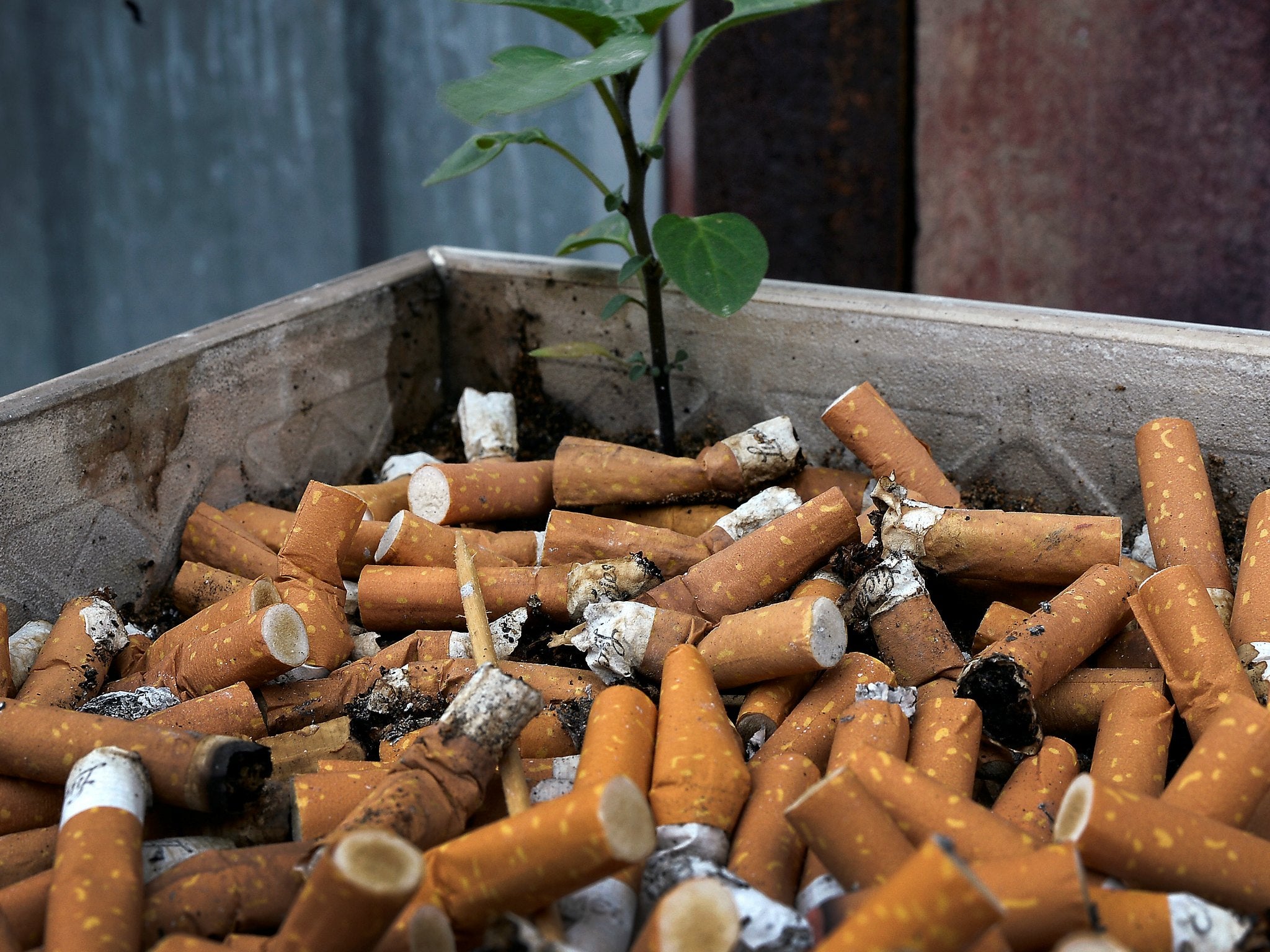Smokers blind to devastating environmental impact of discarded cigarette butts
36% of smokers think cigarette filters are made from cotton wool and only a quarter are aware cigarette butts contain plastic, survey finds

One in three smokers believe cigarette filters are made from cotton wool and only a quarter are aware butts contain plastic, according to a survey which shows many are blind to the environmental impact of their addiction.
More than a third (36%) of the 1,500 smokers polled by Censuswide mistakenly thought cigarette butts contained cotton wool when in fact the white fluffy material is made from a type of plastic (cellulose acetate) which once smoked, can release thousands of chemicals.
Cigarette butts are the most littered item in the world and cause serious damage to the environment by leaching out toxic chemicals over several years, but they don’t get the same attention as other plastic litter which is arguably less harmful.
The survey showed over a third of smokers (34 per cent) believe it takes less than a year for a cigarette butt to decompose but the truth is it doesn’t ever decompose and can take up to 10 years to start breaking down into microplastics. More than a quarter (28 per cent) admit to dropping their cigarette butts down the drain – a direct route to our water ways and oceans.
Cleaning up littered cigarette butts currently costs UK local authorities around £40m per year. Even though throwing a cigarette on the ground is against the law, the survey suggested that 1 in 3 smokers (32 per cent) don’t realise it’s illegal to litter cigarettes.
New research from environmental charity Hubbub reveals just over 1 in 4 smokers (28 per cent) are aware that cigarette butts are made from plastic.
Hubbub took to the streets surrounding Stratford station, the busiest train station in the UK, by installing eye-catching interventions to raise awareness of their plastic content and help cigarette litter be “seen”. This included giant billboards, ballot bins, newspaper stands and “talking butts” to catch the attention of passers-by.
In addition, Hubbub is calling on councils and industry to do more to raise awareness about what cigarette butts and filters are made from and help encourage smokers to dispose of their butts responsibly. Some 55 per cent of smokers surveyed say there are not enough cigarette bins at bus stops, 51 per cent said the same for taxi ranks and 51 per cent said the same for outside supermarkets.
The location of bins has proven to be very important when throwing away cigarette butts. Scientists from Ellipsis Earth who track cigarette litter using cutting-edge mapping software reveal that ashtrays placed in data-highlighted hotspots such as park benches, bus stops and road junctions can reduce littering of cigarettes by up to 90 per cent. In an average town, that’s approximately 40,000 cigarettes a week being captured and correctly disposed of instead of washing into waterways and harming the environment. What’s more, the team’s research shows that butt-free streets reduce the littering of other items too, by up to 75 per cent, so tackling cigarette butts is a win-win for councils, wildlife and the public.
Dr Dannielle Green, an associate professor at Anglia Ruskin University who led the first study to show the damage that cigarette butts can cause to plants in 2019, said: “Cigarette butts are single-use plastics and are hazardous waste. They release microplastics and leach out toxic chemicals that can be lethal to marine and freshwater plants and animals. Even if they don’t cause death, cigarette butts can reduce the ability of certain aquatic organisms to reproduce or feed.
“On land they can contaminate crops with nicotine and reduce the growth of important plants such as grass and clover. Despite being the most common litter item for decades, cigarette butts have flown under the radar in the fight against plastic pollution and it is time to change this.”
Heather Poore, co-founder of Hubbub. said: “Cigarette litter has become invisible and we need it to be seen. We’re looking forward to seeing how our interventions in Stratford are received and call on society in general to help make throwing a cigarette on the ground become socially unacceptable.”
Cllr James Asser, cabinet member for environment at Newham council said: “Discarding cigarette butts on the streets in Newham is not acceptable. Our new litter enforcement officers are tackling this and dropping litter including cigarette ends will result in a £150 fixed penalty notice.”
Subscribe to Independent Premium to bookmark this article
Want to bookmark your favourite articles and stories to read or reference later? Start your Independent Premium subscription today.

Join our commenting forum
Join thought-provoking conversations, follow other Independent readers and see their replies